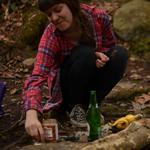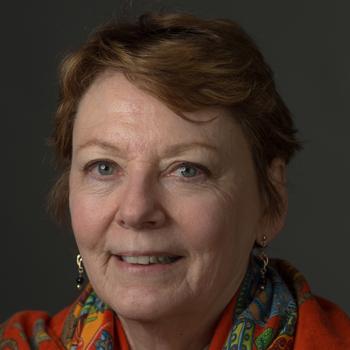From gorilla conservation to autism research, Voinovich School equipped alum for ‘real world’
Whether caring for gorillas or researching autism, Annalisa Weber is certain her master’s in environmental studies from Ohio University’s Voinovich School of Leadership and Public Affairs has left her well prepared.
After completing a thesis on ecotourism and gorilla conservation in Uganda, Weber landed a job caring for gorillas at the zoo in Atlanta, Georgia upon graduation in 2015. Now, she’s beginning a position researching the causes of autism. Although this may seem like quite the leap, Weber says her experience at the Voinovich School prepared her for the latter position just as well as the former.
In one sense, Weber’s research at the Voinovich School, was very specific. “I would go on gorilla treks to see if the gorillas were safe, and I would conduct surveys to determine whether people were engaging in behaviors that promoted conservation,” Weber said.
Nancy Stevens, a professor in OHIO’s department of biomedical studies and the chair of the environmental studies advisory board, worked closely with Weber on her project.
“Annalisa’s motivation and insightful approach made her an ideal student,” Stevens said. “She was able to assemble a sophisticated study examining behavioral stress responses in great apes, combined with a concise assessment of human knowledge and attitudes. The project ultimately provided concrete data that could be used to improve conservation outcomes and enhance long-term economic livelihoods in the study region.”
Weber’s specific research prepared her well for her later position at Zoo Atlanta, where she observed the behavior of gorillas and orangutans and studied orangutan cognition as the zoo’s primate research intern, a position supported by a grant from Zoo Atlanta’s Dian Fossey Gorilla Fund.
Despite the specific focus of her thesis, however, the project required an understanding of a very broad body of knowledge, useful in a variety of contexts. For example, Weber said her ability to conduct surveys has been vital to her recent work in public health, as surveys are the primary means through which she interacts with the public.
“Graduate school really allowed me to round out my skills and prepared me for a diverse range of opportunities,” Weber said. “The Voinovich School is very interdisciplinary, so although I went the biology route, the School connected me with people in different fields that I needed to meet to develop my project.”
Weber was able to develop the skillset necessary to excel in the fields of both conservation and public health through both her coursework and her thesis.
“Our courses provided us a well-rounded set of opportunities,” Weber said. “For example, we had sustainability classes, as well as biology courses. Consequently, people from my cohort ended up in a whole variety of positions.”
Currently, Weber is applying the lessons learned from her courses and her thesis to her research on autism. Weber works for the nonprofit, Research Triangle Institute, and contracts with the Center for Disease Control. Weber’s research contributes to the largest study yet conducted on autism, which aims to understand the causes of autism by attempting to connect outcomes for children to the health, genetics and behaviors of the children’s mothers when they were pregnant. On a day-to-day basis, Weber brings her surveying skills to the job by conducting research interviews with mothers.
“This is science that’s being created right now, and it’s very much on the cutting edge of what’s relevant,” Weber said. “1 in 68 kids have autism here in the U.S., so it feels very important. If we know where autism comes from, then we can intervene much more quickly, improve the outlook for children and, one day, even more toward preventing autism.”
Although Weber might want to switch back over to the environmental side eventually, she said she’s happy where she is for now. “I’m going to stick with the autism study for as long as they’ll have me,” Weber said. “This has been very interesting and has broadened my skillset significantly.”
Furthermore, although public health is a relatively new passion for Weber, it is connected, in her eyes, to what she’s been working on all along.
“My work at the Voinovich School taught me that you cannot achieve conservation without also working to have a healthier public. You can’t just have clean air without clean water, and litter prevention is connected to the health of forests and to people. You can’t only fix one issue.”
Consequently, whether she’s working on gorilla conservation or autism research, Weber knows she’s working to make the world a better place.



